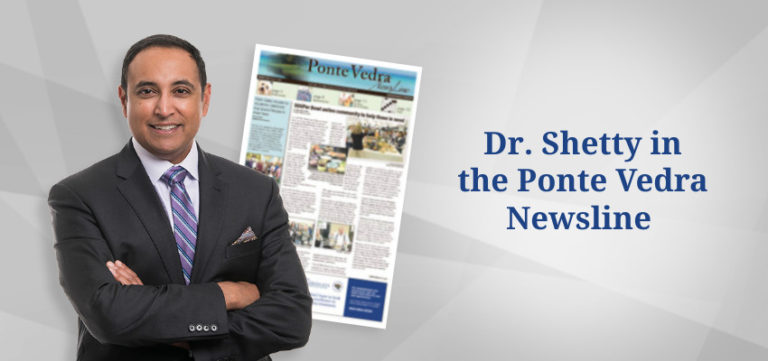In honor of Glaucoma Awareness Month, Dr. Rajesh Shetty was featured in the January issue of the Ponte Vedra NewsLine to discuss this degenerative eye disease. Dr. Shetty covers causes, symptoms, and the latest treatment options to preserve vision. Read the excerpt from the paper below.
Research Finds Glaucoma Patients Have 10 Times as Many Car Accidents
Rajesh Shetty, M.D., Florida Eye Specialists
Glaucoma is a degenerative eye disease that is a leading cause of blindness in America, and a recent study underscores the importance of regular screenings for this condition. The findings, presented at the Association for Research in Vision and Ophthalmology, showed that patients with even moderate glaucoma were in nearly 10 times as many car accidents as patients of the same age without glaucoma. This figure is especially alarming considering that an estimated 50 percent of people with glaucoma do not know they have this disease.
With January serving as Glaucoma Awareness Month, now is the perfect time to review how glaucoma affects vision, risk factors and signs of glaucoma, and the latest treatment options to preserve vision.
How Glaucoma Affects Vision
Glaucoma is actually a group of eye diseases, most of which are caused by excess pressure around the optic nerve. When pressure is too high, usually due to a backup of fluids inside the eye, the nerve cannot continue to be healthy, which can lead to vision problems. Most forms of glaucoma begin with the loss of peripheral vision and slowly erode the entire field of vision. If the condition progresses far enough, it can lead to blindness.
Risk Factors and Signs of Glaucoma
Anyone can be affected by glaucoma, but people ages 60 and over are especially at risk, particularly those with a family history, people of African American or Hispanic descent, and those with eye injuries or extreme nearsightedness.
Because glaucoma develops slowly, patients typically show no sign of symptoms in the early stages of the disease. By the time patients realize they have vision problems, the damage is irreversible.
Glaucoma Treatment Options
Fortunately, there are treatments that can slow progression if glaucoma is caught early. That’s why it’s critical for all patients 60 and over to receive regular, comprehensive eye exams, so we can detect glaucoma and begin treatment right away.
For the majority of cases we see at Florida Eye Specialists, we will first recommend prescription eye drops that help lower intraocular pressure. Most patients respond well to this treatment, delaying or preventing the progression of the disease. For those whose glaucoma is more aggressive, treatment options include laser treatments or eye surgery to relieve the pressure inside the eye.
Don’t take any chances with your vision. If you have questions about glaucoma or are due for your exam, please call our Ponte Vedra Beach office at (904) 564-2020.
Rajesh Shetty, M.D., is a Ponte Vedra resident, board-certified, double fellowship-trained ophthalmologist and CEO of Florida Eye Specialists. For more information on Dr. Shetty and his specialties treating cataracts and glaucoma, visit FloridaEyeSpecialists.com.
